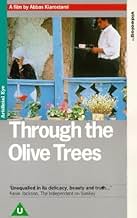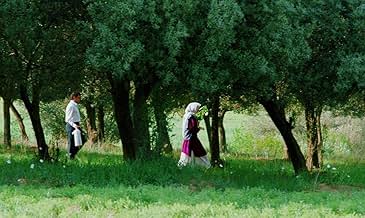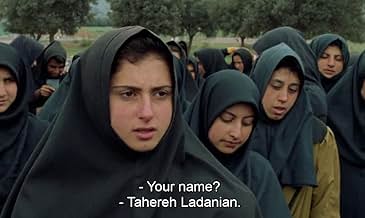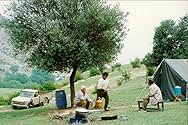IMDb RATING
7.7/10
12K
YOUR RATING
A depiction of the off-screen relationship between the actors who play the newlyweds in the film And Life Goes On (1992).A depiction of the off-screen relationship between the actors who play the newlyweds in the film And Life Goes On (1992).A depiction of the off-screen relationship between the actors who play the newlyweds in the film And Life Goes On (1992).
- Director
- Writer
- Stars
- Awards
- 5 wins & 6 nominations total
Ostadvali Babaei
- Teacher
- (as Astadouli Babani)
Nosrat Bagheri
- Achiz
- (as Nasret Betri)
Khodabakhsh Defaei
- Teacher
- (as Kheda Barech Defai)
Hossein Jafarian
- Hossein
- (uncredited)
Jafar Panahi
- Panahi
- (uncredited)
- Director
- Writer
- All cast & crew
- Production, box office & more at IMDbPro
7.711.5K
1
2
3
4
5
6
7
8
9
10
Featured reviews
10Red-125
Another extraordinary Kiarostami movie
Reviewer's Note: The Iranian movie Zire darakhatan zeyton (1994) was shown in the U.S. with the title Through the Olive Trees. The film was written and directed by Abbas Kiarostami.
The movie is the third of a series of films entitled "The Koker Trilogy." Koker is a small village 200 miles northwest of Tehran. No one outside Iran would know anything about Koker, except for Kiarostami's films. He used Koker as the setting for the first film in the trilogy-Where is the Friend's House? (1987). (This is an amazing movie, with an IMDb rating of 8.1.) However, Koker was still just an obscure village.
Koker is now famous because of a horrible tragedy that took place in the region on June 21, 1990. A devastating earthquake destroyed Koker and many surrounding villages. The loss of life was immense--about 50,000 people died, including 20,000 children. Almost all the buildings were destroyed. Kiarostami directed two more films about Koker. Now, the location is well known to Iranians and cinephiles.
In real life, director Kiarostami and his son traveled to Koker five days after the earthquake occurred. They wanted to find out if the two brothers who starred in the first film had survived the earthquake. Kiarostami turned his trip into a movie. That film was And Life Goes On (1992). He found that despite the immense grief felt by the local people, life did, indeed, go on.
Through the Olive Trees stars Mohamad Ali Keshavarz as The Film Director. He's the only professional actor in any of the three movies. As is usual for Kiarostami, the other actors are local amateurs. Farhad Kheradmand plays Farhad. He was also in And Life Goes On. Zarifeh Shiva portrays Mrs. Shiva, who is the director's assistant.
In this film, Kiarostami has made a movie about making a movie. The movie they are making is And Life Goes On. There's no shortage of movies about making movies. However, I've never seen a movie about making a movie that already exists. It's a brilliant concept, because we can recognize segments of And Life Goes On as they appear in Through the Olive Trees.
However, Through the Olive Trees is really about the relationship of two young people. Hossein Rezai portrays Hossein, who had a four-minute, but important, segment in And Life Goes On. In that segment, he tells us that he and his wife were married the day after the earthquake. They were engaged, the wedding had been planned, and they went ahead with it. This demonstrated a key element of And Life Goes On--the couple embodied the human desire to pick up the pieces and move forward with life, and with replacing death with new life.
In this movie, we learn that Hossain has fallen in love with the woman who played the young wife--Tahereh. However, Tahereh (portrayed by Tahereh Ladanian) apparently wants nothing to do with Hossain. Tahereh lost both of her parents in the earthquake, so she now lives with her grandmother. Her grandmother absolutely rejects Hossain because he's illiterate and doesn't own a house. That makes sense, except that Hossain is intelligent and ambitious, and truly loves the young woman.
So, what we have is a plot within a movie about making a movie. It sounds confusing, but it works.
Kiarostami is famous for using panoramic long shots, and this is what we see at the end of the film. The closing long shot is amazing and unforgettable, but ambiguous.
This is an amazing movie. It has an extremely high IMDb rating of 7.8. I rated it 10. It worked well enough on the small screen, but of course it would be better in a theater. We saw it on a Criterion DVD, sold with the other two movies in the trilogy. The films may be available separately, which would be OK. However, the Criterion edition has many video extras, along with a written essay by noted film critic Godfrey Cheshire.
I would say that the three trilogy movies are all must-see films if you love great international cinema. Find them and watch them.
IMPORTANT: The trilogy should be seen in order of production: Where is the Friend's House? then, And Life Goes On, then, Through the Olive Trees. The movies will each work separately, but they won't work as well if seen out of that order.
The movie is the third of a series of films entitled "The Koker Trilogy." Koker is a small village 200 miles northwest of Tehran. No one outside Iran would know anything about Koker, except for Kiarostami's films. He used Koker as the setting for the first film in the trilogy-Where is the Friend's House? (1987). (This is an amazing movie, with an IMDb rating of 8.1.) However, Koker was still just an obscure village.
Koker is now famous because of a horrible tragedy that took place in the region on June 21, 1990. A devastating earthquake destroyed Koker and many surrounding villages. The loss of life was immense--about 50,000 people died, including 20,000 children. Almost all the buildings were destroyed. Kiarostami directed two more films about Koker. Now, the location is well known to Iranians and cinephiles.
In real life, director Kiarostami and his son traveled to Koker five days after the earthquake occurred. They wanted to find out if the two brothers who starred in the first film had survived the earthquake. Kiarostami turned his trip into a movie. That film was And Life Goes On (1992). He found that despite the immense grief felt by the local people, life did, indeed, go on.
Through the Olive Trees stars Mohamad Ali Keshavarz as The Film Director. He's the only professional actor in any of the three movies. As is usual for Kiarostami, the other actors are local amateurs. Farhad Kheradmand plays Farhad. He was also in And Life Goes On. Zarifeh Shiva portrays Mrs. Shiva, who is the director's assistant.
In this film, Kiarostami has made a movie about making a movie. The movie they are making is And Life Goes On. There's no shortage of movies about making movies. However, I've never seen a movie about making a movie that already exists. It's a brilliant concept, because we can recognize segments of And Life Goes On as they appear in Through the Olive Trees.
However, Through the Olive Trees is really about the relationship of two young people. Hossein Rezai portrays Hossein, who had a four-minute, but important, segment in And Life Goes On. In that segment, he tells us that he and his wife were married the day after the earthquake. They were engaged, the wedding had been planned, and they went ahead with it. This demonstrated a key element of And Life Goes On--the couple embodied the human desire to pick up the pieces and move forward with life, and with replacing death with new life.
In this movie, we learn that Hossain has fallen in love with the woman who played the young wife--Tahereh. However, Tahereh (portrayed by Tahereh Ladanian) apparently wants nothing to do with Hossain. Tahereh lost both of her parents in the earthquake, so she now lives with her grandmother. Her grandmother absolutely rejects Hossain because he's illiterate and doesn't own a house. That makes sense, except that Hossain is intelligent and ambitious, and truly loves the young woman.
So, what we have is a plot within a movie about making a movie. It sounds confusing, but it works.
Kiarostami is famous for using panoramic long shots, and this is what we see at the end of the film. The closing long shot is amazing and unforgettable, but ambiguous.
This is an amazing movie. It has an extremely high IMDb rating of 7.8. I rated it 10. It worked well enough on the small screen, but of course it would be better in a theater. We saw it on a Criterion DVD, sold with the other two movies in the trilogy. The films may be available separately, which would be OK. However, the Criterion edition has many video extras, along with a written essay by noted film critic Godfrey Cheshire.
I would say that the three trilogy movies are all must-see films if you love great international cinema. Find them and watch them.
IMPORTANT: The trilogy should be seen in order of production: Where is the Friend's House? then, And Life Goes On, then, Through the Olive Trees. The movies will each work separately, but they won't work as well if seen out of that order.
One of the five best foreign language movies of the 90's.
This is the art movie in its essence. Every single minute of this movie is complexly detailed. It was considered by the critics a masterpiece but it could not be nominated for the Academy Awards in the 'Foreign Language Category' because of political problems between Iran and USA at the time (but in 99 'Children of Heaven' was nominated).
It was written by Abbas Kiarostama, who also wrote 'The White Balloon' (another great film) and 'Taste of Cherry' (not so good, although it won the Cannes Palm D'or).
This is a must see for any fan of artfilms. Simply fantastic, amazing and everything else, this movie is a 'sea of creativity'.
It was written by Abbas Kiarostama, who also wrote 'The White Balloon' (another great film) and 'Taste of Cherry' (not so good, although it won the Cannes Palm D'or).
This is a must see for any fan of artfilms. Simply fantastic, amazing and everything else, this movie is a 'sea of creativity'.
A Movie about making a movie but not like a Documentary but feels like a complete Movie itself.
Abbas Kiarostami's movies along the likes of Mr.Yasujiro Ozu and Edward yang are just like a calm stream of river that keeps on flowing eternally providing neverending relief, life and peace.
If you have enough patience and interest these movies will never bore you, and you could even watch them for many hours if their runtime was even mkre, but at last provide you with a feelgood experience as their movies are so close to our everyday reality that they feel like the stories in them could happen anywhere around us in any part of the world.
Third part of Abbas kiarostami's Koker trilogy providing behind the scenes outlook to "And life goes on...(1992)", almost feels like a complete story in itself about 2 youngsters trying hard to find eachother in all the tension surrounding, after the 1990 earthquake.
The minimalistic director Abbas kiarostami does wonders in almost his every movie that many action directors could not, a true genius.
Quite hard work despite interesting characters and places to round out the trilogy
Following a film he made a few years backs, a director returns to the area where it was shot to try and find the actors who he used. The area has been hit by a large earthquake and the film is designed to help the area as well as follow up on the people. Among the cast is a young man, Hossein, who has fallen for one of the other actors and seeks to marry her but her grandmother refuses to consider any such offer; ironic perhaps, considering Hossein's character in the film is married to the very girl he loves in real life.
While making the sequel (or follow up) to "Where is the friend's house?" Abbas Kiarostami met a man who told him that he was married 5 days after the devastating earthquake (50,000 dead) that is the foundation for that film. A few years later Kiarostami decided to use this man and his story as the basis for this rather intriguing film within a film. The dual plots are interesting and work well in contrast to one another to fill out a plot that is not the easiest to get excited about or really engaged by. In this regard many viewers may feel bored or distant from the material as it doesn't quite build a story that well. The "film within a film" concept is interesting but it produces many scenes that are replayed over and over (different takes) without the repeats adding a great deal in fact they seem to take away from the rhythm of the film more than give to it. As with other Kiarostami films, it is slow and requires work, but even if you are willing to put yourself into it, it is still not easy work.
The characters and place are interesting and it does feel like these are over and above the material itself. The film will be of greater interest to those who have seen the other films in the trilogy as the places and people have history to them, but they are still well enough done to avoid it being key to the film. The cast do pretty well throughout; Rezai steals the show with a good performance; Ladanian is totally absent and her performance will be hard (was hard!) for a Western audience to appreciate. Keshavarz does pretty well in the role of the director.
Overall this is not a film to come to unless you have seen at least one of the other two films (ideally both. It is watchable without this knowledge but even with it, it is hard work at times. The narrative is slow and not that important apparently and, although the characters and places are interesting, I did struggle to really get emotionally involved in the film. Interesting enough to be worth a look but don't expect too much from it.
While making the sequel (or follow up) to "Where is the friend's house?" Abbas Kiarostami met a man who told him that he was married 5 days after the devastating earthquake (50,000 dead) that is the foundation for that film. A few years later Kiarostami decided to use this man and his story as the basis for this rather intriguing film within a film. The dual plots are interesting and work well in contrast to one another to fill out a plot that is not the easiest to get excited about or really engaged by. In this regard many viewers may feel bored or distant from the material as it doesn't quite build a story that well. The "film within a film" concept is interesting but it produces many scenes that are replayed over and over (different takes) without the repeats adding a great deal in fact they seem to take away from the rhythm of the film more than give to it. As with other Kiarostami films, it is slow and requires work, but even if you are willing to put yourself into it, it is still not easy work.
The characters and place are interesting and it does feel like these are over and above the material itself. The film will be of greater interest to those who have seen the other films in the trilogy as the places and people have history to them, but they are still well enough done to avoid it being key to the film. The cast do pretty well throughout; Rezai steals the show with a good performance; Ladanian is totally absent and her performance will be hard (was hard!) for a Western audience to appreciate. Keshavarz does pretty well in the role of the director.
Overall this is not a film to come to unless you have seen at least one of the other two films (ideally both. It is watchable without this knowledge but even with it, it is hard work at times. The narrative is slow and not that important apparently and, although the characters and places are interesting, I did struggle to really get emotionally involved in the film. Interesting enough to be worth a look but don't expect too much from it.
A bold statement of love and color, a poem
This epoch-making poem opens with a film crew trying to cast for a movie in a provincial village, in the aftermath of A DEVASTATING EARTHQUAKE which has claimed many, many lives. We then are shown that the remaining people are trying to rebuild their lives, picking up bits and pieces of the past, but with an eye to the future.example of these people are the boy and the girl who are selected to play the protagonists of the melodrama to be made. The crew's interest interest in these people is limited to their role and usefulness for director's vision of the film, and no more. But-and this is a crucial BUT-the boy and the girl have their own agenda, and don't care very much for the screenplay dictated by the director (for instance repeated takes of the tea-serving scene): The girl wants to wear colorful and jolly dress, and the boy wants to be able to love her. Eventually, the boy follws the girl into the magnificent ending shot of the expanse of the olive groves, and into the ubncertain but potentially hopeful future. Will life, love and color be able to vanquish darkness and death? Will the boy and the girl find the courage and and power to fire the crew, the director, the casting agent , down to the ticket-vendor and become subjects of their own life and destiny? ... This is to be continued.........
Did you know
- TriviaThe first film in which Abbas Kiarostami has hired a professional actor (Mohamad Ali Keshavarz who plays the director of the film-within-the-film).
- ConnectionsFeatured in Cinema Iran (2005)
- How long is Through the Olive Trees?Powered by Alexa
Details
- Release date
- Countries of origin
- Official site
- Language
- Also known as
- Under the Olive Trees
- Filming locations
- Production companies
- See more company credits at IMDbPro
Box office
- Gross US & Canada
- $40,300
Contribute to this page
Suggest an edit or add missing content

























